- Home
- Matthew Pearl
The Professor's Assassin
The Professor's Assassin Read online
Also by Matthew Pearl
The Last Dickens
The Poe Shadow
The Dante Club
Forthcoming Titles
The Technologists
The Professor’s Assassin is a work of fiction. All incidents and dialogue, and all characters with the exception of some well-known historical and public figures, are products of the author’s imagination and are not to be construed as real. Where real-life historical or public figures appear, the situations, incidents, and dialogues concerning those persons are entirely fictional and are not intended to depict actual events or to change the entirely fictional nature of the work. In all other respects, any resemblance to persons living or dead is entirely coincidental.
2011 Random House eBook Original
Copyright © 2011 by Matthew Pearl
All rights reserved.
Published in the United States by Random House, an imprint of The Random House Publishing Group, a division of Random House, Inc., New York.
RANDOM HOUSE and colophon are registered trademarks of Random House, Inc.
eISBN: 978-0-345-53014-1
Cover design: Gabrielle Bordwin
www.atrandom.com
v3.1
Contents
Cover
Other Books by This Author
Title Page
Copyright
Chapter 1
Chapter 2
Chapter 3
Chapter 4
Chapter 5
Chapter 6
Chapter 7
Chapter 8
Chapter 9
Chapter 10
Chapter 11
Chapter 12
Afterword
About the Author
Excerpt from The Technologists
Chapter 1
William Barton Rogers’s eyes tracked the bursts of light in the darkness outside. The other men in the room kept away from the window, as though there was somewhere to hide. More gunfire rumbled from the east, then the west. A fiery missile passed over the skylight at the center of the domed ceiling. The university’s bell tolled, as it had for hours, echoing in Rogers’s mind even when it paused.
They were surrounded.
“There must be something more we can do!” Gessner Harrison, one of the faculty members, said, hitting the table with his fist. Despite his bravado, the professor of ancient languages seemed more alarmed than resolved.
“How would you wish us to proceed, Gessner?” asked George Tucker, the professor of moral philosophy, the most senior among them, who, unlike the younger faculty surrounding him, had been at the University of Virginia since the days of Jefferson and carried the years in the creases of his face. “Have them all arrested and expelled?”
“Arrest them all. Expel them all!” Harrison responded, holding his father-in-law’s gaze. “They deserve far worse. And they speak of ‘honor’! I will tell you what I reckon. I reckon this is what comes of not having required religious services and, moreover, having admitted too many Virginia boys here on charity who were not morally fit to be here in the first place.”
“Pardon me?” Rogers replied, wheeling around from his place at the window. “There must be a hundred students out on the lawn, Professor Harrison. There are hardly a dozen in the entire university who are here on charity, by my count.”
Harrison glared up at his colleague as he might at an impudent student. “The mere influence of a few minds can be like arsenic, you know, Professor Rogers. Once you are teaching here a few years more, you may understand the life of our university better.”
“The leaders of these riots clearly believe there are no consequences to action,” Rogers said. “I’d say hubris like that comes out of wealth and privilege more than poverty.”
“After all, Gessner, it was President Jefferson’s ideal,” Tucker said to his son-in-law, “that we open our doors to educate a certain number of local boys each year who would otherwise not have the opportunity.”
“Jefferson also wished to fill our halls with foreign professors, didn’t he?”
Tucker nodded at the point. “He believed a European influence was important to broaden our young men’s intellectual boundaries.”
“You object to foreigners as well, Professor Harrison?” Rogers asked.
“If they do not share in our peculiar virtues, aye!” Harrison said. “Who else here agrees? Yes, as I thought, the ayes have it!” he crowed, even though none of the other men had indicated a position.
“Gentlemen, please,” interrupted John Davis, the faculty chairman. He offered a kindly smile first to Harrison and then to Rogers. Even in the middle of a student uprising, Davis could stop and smile. He had a round face with an aquiline nose and almond eyes that were as calming as his general manner. “Please, let us at least try and maintain peace and harmony in this room, despite the circumstances we find ourselves in.”
Rogers sat down, and Harrison followed his example. From the time he was a young man, Rogers had always been easily drawn into confrontation, and for that long he had regretted the tendency. He silently vowed that from now on he’d avoid Harrison, who was obstinate in all things and brought out a flavor of preachiness Rogers did not like in himself.
Davis may have been blessed with an almost otherworldly tranquility, but the rest of the men—Tucker, Harrison, the aloof professor of surgery, James Cabell, his somber colleague in the medical department Henry Howard, plus the bursar and secretary—were all as wearied as Rogers by this point. With two nights of unrest behind them—begun by a faction of students that wanted to be armed at all times—the professors had decided to formulate a plan of action by gathering in the dome room of the grand Rotunda, the central locale of the Academical Village designed by the university’s founder, Thomas Jefferson. With the modern languages and mathematics chairs vacant from a dismissal and death, respectively, and a Board of Visitors that—as suggested by the name—congregated only periodically, it fell to these six professors to resolve the matter. Starting that afternoon, they had discussed, debated, argued. Yet now, dusk fallen, their meeting had produced few results, while the pandemonium out on the lawn had begun once again. Word must have spread about their meeting, for they had received a message from the leaders of the riot. It read as a warning against action: “We have our arms, and we intend to keep them. Every member of our company pledges his honor to stand by his comrades, and action against one shall affect every individual.”
Chairman Davis continued, “Gentlemen. My friends. I’m afraid we are getting nowhere. Professor Tucker is correct. It would not accomplish anything even if we were somehow able to identify and reprimand each of the wrongdoers. If many of them are seniors, as we suspect, what would happen in the new year when the class of 1841 must be graduated? No. We still have a university to operate, and like it or not, we cannot survive our expenses without a full student body.”
“But three nights of riots now!” Harrison pressed. “What do we do to stop this evil, Professor Davis?”
“I think we must consent to a meeting with their leaders,” answered the chairman.
“Not to yield to their demands, John?” Tucker asked. “We would not ever authorize college students carrying firearms to class and their dormitories, would we?”
Davis shook his head reassuringly. “We shall yield to one demand only, Professor Tucker: That is agreeing to meet. This by itself will make the leaders heroes to their fellow students. Men prefer to be heroes. At the meeting, the ringleaders will not be protected by masks and the freedom that anonymity engenders. They will become the boys that they are—young men with good hearts and open minds who have been merely led astray by natural wildness and the heady environment of a college setting. I wi
ll offer a bargain. I will promise them clemency if they bring the riots to an immediate close.”
“What of their punishments?” Harrison asked.
“Let us expend our moral energies to forgive rather than to punish,” Davis replied.
Around the large round table in the center of the circular library room, the other faculty members voted one by one for Davis’s plan. Further discussion broke off as a university slave—or “servant,” in polite circles such as this—burst into the room and, trying to catch his breath, approached Harrison.
“Haven’t I instructed my servants always to knock?” Harrison reprimanded him.
“A gang of ’em! Surrounding your pavilion, Master Harrison, breaking windows and kicking at doors!” cried the messenger.
“Eliza and the children are there!” Harrison cried, springing to his feet. “Why didn’t you do something, you fool?” he demanded.
The slave said nothing, but Rogers almost laughed aloud at the absurdity of the question. Negroes who served the university had been beaten within an inch of their lives for merely questioning something a student did or said.
“Eliza!” Tucker rose as well and gripped his son-in-law’s arm at the mention of his daughter. “Gessner, go at once! You must protect her!”
“I will go with you, Professor Harrison,” Rogers volunteered.
“Thank you, Rogers,” Harrison said, gripping his colleague’s hand and pumping it. “You shall have my undying friendship. Oh, how they will regret choosing my pavilion when they see me coming for them!”
Somehow, Rogers tended to doubt it.
Chapter 2
The lawn was deceptively quiet as the two professors progressed cautiously down the steps of the Rotunda. But the peace was fleeting. Another round of pistol and musket fire soon erupted, followed by a cacophonous playing of horns. Then the tolling of the bell began once more, resuming the sacrilegious performance that had begun some three hours earlier, when the rioters had apparently broken down the door of the belfry.
On either side of the Rotunda, which encompassed much of the university life, including lecture halls, the gymnasium, and faculty offices, stretched two parallel rows of smaller buildings that included dormitory rooms, hotels—as the buildings where the students congregated to take their meals were called—and ten classically designed pavilions, where professors resided with their families and convened their courses. The rest of the property was open and green, the central lawn elegant and unadorned, and the gardens tidy.
Rogers was irritated with himself for so quickly breaking the resolution he had just made to avoid Harrison, but the man needed help against these boys whose faces and inhibitions were cloaked by the night and by strong drink. Rogers, at thirty-five, was two years younger than Harrison. But while the ancient languages professor, shorter than average, looked as though he could still be a student, Rogers had often been complimented on his self-assured bearing, and among students, at least, his presence had always seemed to inspire a degree of deference.
Rogers held a candle high in his hand, leading the way for Harrison through the portico that ran along the pavilions. Many of the lamps around the lawn had been cracked or otherwise disabled.
“Wouldn’t we have been safer using the terraces?” asked Harrison, referring to the upper walkway that connected the Rotunda to the pavilions.
“There would be nowhere for us to run if the rioters were hiding up above and looking to cause us mischief,” Rogers answered. “And without proper light, we would be easy prey.”
“I suppose you could have guided us by looking only at the stars,” Harrison said with a nervous laugh. “You do study the stars and heavenly bodies in addition to the soil and earth, don’t you, Professor?”
“I study all the principles of physical truth,” Rogers answered. There were so few professors of science, he could not afford to be specialized. Geology was his most frequent and reliable pursuit, certainly, because of his contracts with the Commonwealth of Virginia to complete the first comprehensive geological survey of the state and its natural resources. But chemistry, physics, astronomy, and engineering deserved equal attention, and he never failed to urge his students toward the pursuit of all the disciplines.
“You know, I am not like some of the others on the faculty,” Harrison said, apparently attempting to buttress his earlier pledge of friendship. “I do not take offense to all your expeditions away from the university to dig through limestone and other such activities. If a man wishes to pursue strange habits, even those unbecoming a professor, I tell Liza, it is not my affair. I oughtn’t try to press them into a higher purpose.”
“When we arrive, let us survey the scene from a distance first, Harrison,” Rogers said, ignoring the comments. “If the rioters have not yet moved on, we must determine how many they are and where they are positioned in order that we may best reach your family. We are safest if we remain together. Do you understand?”
“The rabble best be away from my pavilion when I get there, for their sakes!” Harrison snapped.
Rogers repeated, “Do you understand what I said, Harrison?”
“Yes, yes, Rogers! You needn’t lecture at me.”
“I worry these disturbances will grow worse before they become better, Harrison,” said Rogers. “Have you ever seen anything like it?”
“Oh, mischief, even boyish riots, yes. I have seen them going back to my student days. The University of Virginia has always fostered independence of thought and spirit. But this sort of outright … rebellion …” He let the statement hang there.
“Rebellion” was a fit choice of word. With the increase in abolitionism from the North—indeed, with some anti-slavery sentiments of that movement even circulating among Virginia natives—the students’ demands to carry firearms was symbolic not just of their autonomy on the grounds of the university but of their readiness to fight invaders. The faculty had not denied their requests outright. In fact, Professor Davis had issued a statement agreeing to allow a student militia, with certain limitations and conditions. But the University Volunteers, as the leaders of the movement styled themselves, would accept no conditions and so began the latest upheaval.
“Davis must be stricter with the students,” Harrison continued. “If I were still chairman, you can be sure I would have a military force ranged against them! If only that half-beast of a boy hadn’t … Well, Davis shall learn, you cannot hold their hands for long without them biting your knuckles.”
Rogers only nodded, not wanting to dwell on the topic of Harrison’s past tenure as chairman. After Harrison had expelled a student the year before, the disgruntled party found Harrison on the lawn and horsewhipped him while other students watched. Soon after, Davis was elected to succeed Harrison in the position of chair. Though no reason was articulated, all the professors—Harrison included—knew the faculty feared a perception of weakness would cling to Harrison, which could in turn inspire more violent action against professors.
They passed two tar barrels overturned and set aflame in front of one of the professor’s gardens. Soon Pavilion V, the Harrisons’ domicile, came into view, where they could make out half a dozen masked students shattering the windows with bats and kicking at the doors. Harrison broke stride and ran like a madman for his home, shouting for his wife.
“Wait!” Rogers cried, hurrying to keep pace.
Harrison scrambled up the walk and to his front door. “Liza, it’s me! Let me through!”
The door was unlatched long enough for Harrison to squeeze in. When Rogers reached the doorstep seconds after, he found it latched and bolted. “Harrison, it’s me! Open this door!” he called.
“It’s Rogers!” he could hear Harrison shouting inside.
“No! Don’t open it!” cried out Eliza Harrison. “They’re everywhere!”
“Rogers, I thank you for your help most sincerely!” Harrison called out. “We cannot risk them getting in. Go now! Run!”
“Harrison, you open this door d
irectly! I insist upon it!” Rogers demanded, pounding on the door. But Harrison’s wife was right. Swinging around on the front steps, holding his candle up, Rogers found himself surrounded by marauders holding brickbats and other weapons. “You are to disperse at once,” he announced, masking his fear with cold authority.
Through the holes in their black wool masks the students’ eyes moved over him in a way that seemed detached, devoid of humanity.
Rogers could still hear Harrison inside, herding his family upstairs, then berating the assailants from a window above, shouting, “Go away, you vile, ugly, criminal dastards!”
For a tense moment more, the masked crowd studied Rogers. Then they seemed to reach a silent, collective conclusion that Rogers was powerless to do anything and thus could be ignored. They resumed their assault on the house, howling with delight. Rogers could have slipped away. He knew he should. But he remained.
“Stop that! You stop that!” he commanded, again and again, to no avail. Finally he stepped around the side of the pavilion and crouched in the shadows of the gardens. Waiting for the right moment, he sprang out of his hiding place and grabbed the next miscreant who came by him. He threw the rogue over his shoulder and dragged him to the Harrisons’ doorstep, where he tore off his mask, revealing a freckle-faced eighteen-year-old who could have passed for fifteen.
“Let this be a warning to all of you! There will be nowhere to hide if you continue on this course!” Rogers shouted, his boot heel on the captive’s chest. The other rioters froze, gaping at their imposing science professor in his dramatic tableau. Rogers felt triumphant, as though he had just achieved victory for the entire South, the University of Virginia, and even the late Thomas Jefferson himself.
“Let him go.” The speaker was one of the bigger masked figures. He had a stick in one hand and a pistol in the other. His cohorts stirred uneasily as the speaker trained his pistol on Rogers.
“Put up your pistol,” said Rogers evenly.
“I ought to cowhide you!” replied the big student. “Insolence! And from a professor! How dare you speak to a University Volunteer in such a tone?” He moved closer, the pistol steady. “You’ll regret this day, Professor!”

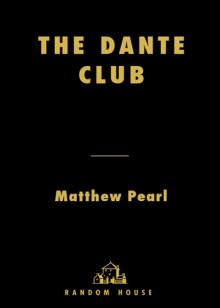 The Dante Club
The Dante Club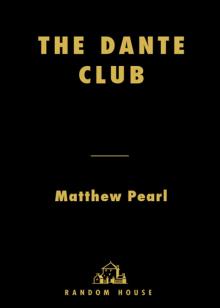 Dante Club
Dante Club The Poe Shadow
The Poe Shadow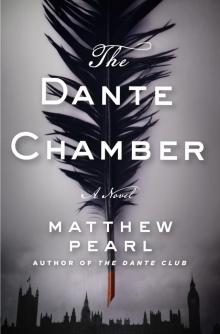 The Dante Chamber
The Dante Chamber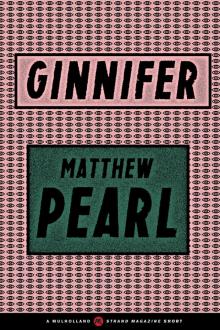 Ginnifer
Ginnifer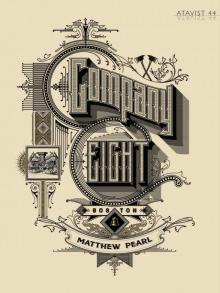 Company Eight
Company Eight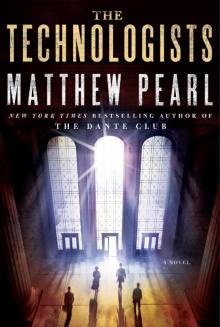 The Technologists
The Technologists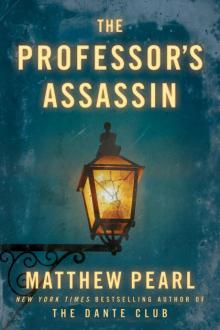 The Professor's Assassin
The Professor's Assassin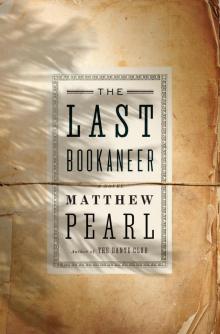 The Last Bookaneer
The Last Bookaneer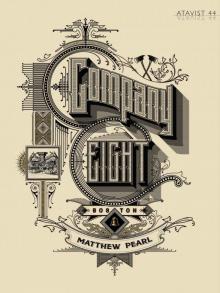 Company Eight (Kindle Single)
Company Eight (Kindle Single)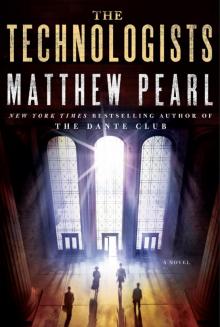 The Technologists: A Novel
The Technologists: A Novel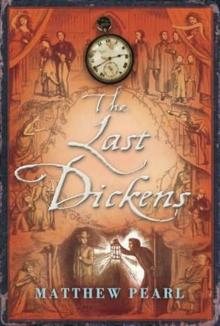 The Last Dickens
The Last Dickens